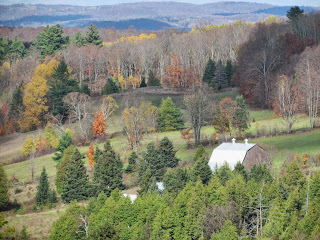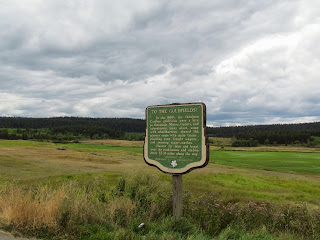This is the loveliest spot in the village. The one business was a very busy gas-grocery-LCBO complex in an old house. We stopped in the crowded parking lot, and I dashed across the speedy highway to take a moment, and a photo.
 |
| to find the actual Parkhurst homestead I shall have to enquire the way of Eurithe |
 |
| 1943 - courtesy E.Purdy |
A few scattered village houses, then back into the silence of the country. On a farm such as the one above, carved from the forest and rocks, was born one Eurithe Mary Jane Parkhurst. In early years here she learned her determination, her make-do attitude, her strength and forbearance, her practicality, fearlessness and imperturbability.
She needed all of those as she made her life with Al Purdy.
 |
| Eurithe and son Jim, 1945 photo courtesty E. Purdy |
Al can do it. In the poignant preface to his last book 'Beyond Remembering' , poems selected by Al and editor Sam Solecki, Al Purdy creates a image of Eurithe in this interchange:
"...And to thank Eurithe for many many reasons. I said to her a moment ago, 'What does it feel like to live with someone who write poems most of his life and yours?'
She said, 'To me it feels normal. I can't compare it with anything else. It was a life.'
Sure it was a life. But can't I wring even a modest superlative out of her like: 'Al, it was wonderful! I loved every minute of it!' Couldn't she lie a little just to make me happy? I tell you it's maddening to live with a woman who always has to tell the truth...."
Al could do it. And so could his poems. Read The Horseman of Agawa. And there are many many others.
It was quite a life. And still is. Eurithe is a difficult woman to keep up with.
 |
| photographer unknown. Printed in The Al Purdy A-Frame Anthology Harbour Publishing 2009 |





















